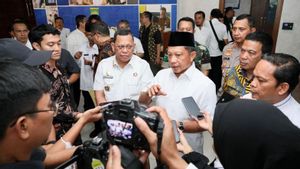AKARTA - The feud between PT Alpen Food Industry (AFI) and the Indonesian labor movement union (SGBBI) continues. The workers think that the company has carried out a unilateral termination of employment (PHK), and prepares a plan to deter employees who want to return to work by involving the police and the TNI.
Alpen Food Industry Legal Corporate, Simon Audry Halomoan Siagian, spoke about this. He explained that the chronology of the dismissal of the 469 employees who were members of SGBBI started with guidance on wages by going on strike.
According to Simon, the strike was carried out twice. The first time was on December 20, 21 and 23. Due to the three-day strike, Aice qualified as an illegal strike. At this time, Aice made her first job call.
"On December 19 at the first mediation stage, Aice and SGBBI were present. On 23, the second stage of the SGBBI mediation was not present. Then, SGBBI proposed to work again on December 26. They returned to work," said Simon, when met at the Aice Factory, Karawang, West Java. , Saturday, July 4.
Simon explained, on January 20, 2020, the Manpower Office and PHI issued recommendations regarding the increase in wages or salaries that employees demanded. AFI accepted the recommendation, but SGBBI refused.
It is said, in the minutes on the settlement of industrial relations disputes that in accordance with the provisions of Article 14 paragraph (2) of law number 2 of 2004, the parties or one of the parties can file a dispute settlement by submitting a lawsuit to the industrial relations court.
Simon said, SGBBI also refused to solve the problem through PHI, and reported Aice to the Ministry of Manpower, Komnas Perempuan, Komnas HAM and others regarding other issues that were not the problem of labor strikes.
"They staged a demonstration at Aice's head office. Damaged Aice's image on social media. On February 21 they staged a second strike for 7 consecutive days," he said.
According to Simon, in the second strike action, his parties had made a written summons to return to work which was sent to the respective addresses of workers registered at the company.
"We have issued written summons twice, please enter on that date but it has not been responded to. We send another letter, no more. Because of their action in front of the office, we also summoned them to enter using loudspeakers. We gave them 15. minutes to take action, but no one came back, "he said.
Regarding not all employees receiving summons, Simon said that his party can ensure that all employees receive the letter because the letter is sent by courier.
"We check everything is sent, we send it using JNE and we have proof of receipt of every letter we send. We ask JNE to provide a copy of receipt that those sent to this address have received the letter," he explained.
However, Simon said, if someone said they did not accept this, they could have moved from their old address recorded at the company. "It is possible to move boarding house, but we do not report it to us. Meanwhile, we send it to the address recorded in us," he explained.
Simon said, because they had been on strike for 7 days, as many as 469 people were qualified to be absent and then the company decided to resign.
Furthermore, Simon said, this decision was taken in light of articles 3 and 6 in the Minister of Manpower Regulation Number 232 of 2003 concerning the Legal Effects of Illegal Strikes.
Article 3 point a reads that a strike is illegal if it is carried out because of failed negotiations.
Article 6 reads, namely:
Paragraph (1) A strike that is carried out illegally as referred to in Article 3 qualifies as being absent.
Paragraph (2) Summons to return to work for strikers as referred to in paragraph (1) shall be carried out by the company 2 times in succession within a period of 7 (seven) days in a proper and written summon.
Paragraph (3) Workers / laborers who do not fulfill the summons as intended in paragraph (2) are considered as using themselves.
"We classify them as layoffs by resigning, it has been proven by this article," he said.
With regard to employee oblivion by involving the security apparatus of the Police and the TNI, said Simon, this was done in anticipation by the company in order to prevent bad things from happening. For example, sabotage.
"So the reason we involve security in this guard is to secure our employees who work and we are food products. We are very careful about sabotage. Health and safety at work we are very careful, especially people who are indeed it is already at odds that re-entry would be very dangerous, "he explained.
According to Simon, the involvement of the security forces was also carried out after a series of mediations, starting from direct meetings to summons using letters and decisions were made with dismissals with qualifications for resignation.
"So before any disagreements against the disputing workers, we first sent letters twice. They replied that they did not want to enter and on the eighth day we decided to lay off because they resigned. I can confirm that the involvement of the security forces was after they were officially laid off. They officially broke up on February 29, "he said.
As previously reported, SGBBI member Indra admitted to being unilaterally cleared by the company Aice. The employees who went on strike had agreed to return to work after carrying out the action.
However, Indra explained, the company made plans to repel employees by involving complete security forces from the Police and TNI.
Indra assessed that the actions taken by his company were unilateral layoffs. Because, when employees plan to return to work, the company actually makes a work decision.
"When PT AFI made the summons, we responded to a letter from PT AFI that we were on a strike. But PT AFI returned a response letter from an SGBBI member who received a call to come to work. When we wanted to enter we were prevented from returning to work," said Indra.
The English, Chinese, Japanese, Arabic, and French versions are automatically generated by the AI. So there may still be inaccuracies in translating, please always see Indonesian as our main language. (system supported by DigitalSiber.id)













